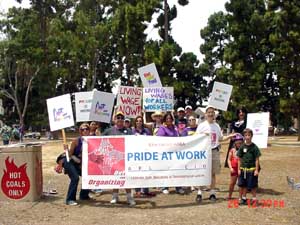-
- Gov. Davis works to shore up gay support
- Researchers study smallpox vaccine
- Second suit filed challenging AB 205
- Kerry targets GOP over offensive t-shirts
- San Francisco syphilis epidemic worsens
- N.Y. Conservative Party boss slams Dems on gay marriage
- Man with HIV appeals denial of kidney transplant
- New Jersey supports civil unions
- National News Briefs
- World News Briefs
san diego
Pride At Work holds biennial convention
Local member elected to national board
Published Thursday, 02-Oct-2003 in issue 823
The Pride At Work Fifth Biennial Convention took place the weekend of Sept. 19-21 in Tyson’s Corner, Washington, D.C. Despite the fallout from Hurricane Isbabel, the convention featured plenary speakers and workshop presentations ranging from GLBT equality and immigration/anti-racism issues to “How to Make Gay Pride More than a Disco Float.” The convention is primarily held as a networking opportunity for local chapters, but is also geared towards establishing new chapters and educating members on how to operate them effectively.
National Pride At Work is a constituency group of the AFL-CIO. Begun in 1994 in New York around the 25th anniversary of the Stonewall riots, Pride At Work’s purpose is to build support for GLBT rights in the workplace, lobby for pro-GLBT legislation, and unionize GLBT organizations and GLBT people into the trade union movement. Pride At Work has helped establish domestic partner benefits, provides HIV/AIDS education and educates businesses on GLBT needs in the workplace.
Since the 1970s, many unions have been fighting for civil rights, including GLBT rights, and lobbying federal and state levels for domestic partner benefits, which most states still do not have. Operating under the labor union movement’s motto, “an injury to one is an injury to all,” Pride At Work mobilizes the labor movement and affiliated community coalitions to be inclusive of GLBTs, and adopt non-discrimination policies that include sexual and gender orientation. Discrimination policies in union contracts enforce GLBT rights in the workplace – without adequate federal legislation, these contracts are often the only protection GLBTs have.
In the last year, Pride At Work has issued a resolution in support of the Ottawa same-sex marriage law, and another supporting transgender-inclusive legislation. Pride At Work is so serious about transgender inclusion that their national policy will not endorse the Employment Non-Discrimination Act because it does not list transgender people as part of its sexual orientation non-discrimination policy.
Past resolutions have been issued in support of the Coors boycott and the Work and Family Bill of Rights in 1999, affirmative action and opposition to the death penalty in 2000, and condemning racial profiling and the Boy Scouts of America’s discrimination policy in 2001. They have also issued resolutions in support of immigrant workers and in opposition to the pre-emptive attacks and war in the Middle East in 2002.
To further address the needs of Pride At Work’s members, transgender, people of color, and youth caucuses were added to the national convention this year and a new slate of national directors was elected. “Building Coalitions in Your Community,” which comprised two of six workshop tracks at the convention, focused on connecting with the diversity of the GLBT community, including racial diversity, and making sure each letter of GLBT was represented equally.
Pride At Work’s San Diego chapter was started in 1999 when Jerry Butkiewicz, secretary treasurer of the San Diego and Imperial Counties Labor Council, marched in the San Diego LGBT Pride Parade with a banner protesting the union-busting of the San Diego Union Tribune. When the union representative for Local 535, a statewide union based in Oakland, decided to march in the contingent, so did Brian Polejes, a social worker at the time and fellow Local 535 member. “That is really what got me more involved in the labor movement,” said Polejes.
“I think it’s great,” said Polejes, “considering how diverse this group [of Labor Council delegates] is. You’ve got plumbers, pipe fitters, construction guys and gals. This is how we grow our movement and our coalition.”
This year, the San Diego Pride At Work has had three main priorities: supporting the Living Wage Campaign, getting the City Council to amend the Human Dignity Ordinance to include transgender people (unanimously approved earlier this year), and protesting Proposition 54, which seeks to eliminate gathering of racial data in California.
“We had good contingents in [2002 and 2003 Pride] parades,” Polejes said. “We had signs supporting the Permanent Partners Immigration Act [in 2002]. That’s what I mean about how we advocate on the LGBT issues and on the labor issues. This year we had signs supporting the Living Wage Campaign.”
At the national convention this year, Polejes was elected to the national board as one of two delegates representing smaller local chapters.
“We are really privileged to be here in San Diego and in California,” said Polejes.“We have legal protection that exists nowhere else in the country. I mean, Vermont has civil unions, but we’ve got it on the state and the city level; we have transgender protection [in some areas], and the county workers that I represent have domestic partner benefits for both same-sex and other-sex couples. California is cutting edge, and we need to get the other states up to par.”
What are the year’s goals for San Diego Pride At Work? Polejes would like to see the local chapter grow, through mentoring, and encourage new leadership. “With any small organization, they tend to get down to one or two people doing the work,” he said. “If those people get busy or move on, then the work dies, and I’m committed to this work continuing.” He would like to spread information about the coalition to other local unions that have a large GLBT membership, and would also like to raise the profile of working family issues in the GLBT community, including class and race-sensitivity.
|
|
Copyright © 2003-2025 Uptown Publications


